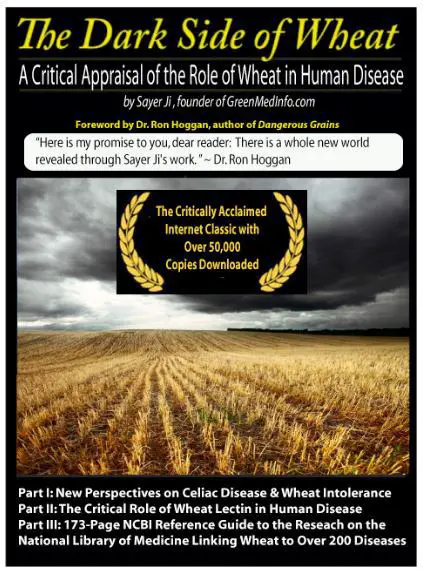By Sayer Ji
Contributing Writer for Wake Up World
How ironic it would be for the most prized food of Western culture — wheat — to be at the root of the global epidemic of depression?
The powerful neurotoxic and psychoactive properties of wheat have only recently come to light. For many decades the near exclusive focus was on gluten’s life-altering gastrointestinal adverse effects – once considered exceedingly rare and limited to those with celiac disease. Only now are we beginning to realize that this “king of grains” is truly a debilitating force in the Western diet that we must go to great lengths to avoid.
Beyond the already 200+ adverse health effects identified in the biomedical literature on this globally popular food’s inherent health damaging properties, a solid body of research also exists linking wheat to schizophrenia, acute bouts of mania, autism, cerebellar ataxia, reduced blood flow to the brain, autoimmune neurological issues, and many other neurotoxic reactions. For an exhaustive analysis of the neurotoxicity of wheat visit our Wheat Toxicity page which contains 24 biomedical citations on wheat’s brain- and nerve-damaging properties.
[pro_ad_display_adzone id=”110028″]
Recently, the holistic psychiatrist Dr. Kelly Brogan, MD, reported on the relationship between gluten consumption and depression in non-celiac disease subjects on her cutting-edge website, commenting on a study published in the journal Alimentary Pharmacology and Therapeutics titled, “Randomised clinical trial: gluten may cause depression in subjects with non-coeliac gluten sensitivity – an exploratory clinical study,” wherein it was clearly revealed that gluten consumption significantly increases the risk of depression.
The doubled-blind cross over study consisted of twenty-two subjects (24-62 years, five male) with irritable bowel syndrome who tested negative for celiac disease and whose condition was symptomatically controlled on a gluten free diet.
The participants randomly received one of three dietary challenges for 3 days, followed by a minimum 3-day washout before crossing over to the next diet. Their gluten free diet was challenged with either gluten (16 g/day), whey (16 g/day) or not supplemented at all (placebo). The study end-points included mental state as assessed by the Spielberger State Trait Personality Inventory (STPI), cortisol secretion and gastrointestinal symptoms.
The results of the intervention were reported as follows:
Gluten ingestion was associated with higher overall STPI state depression scores compared to placebo [M = 2.03, 95% CI (0.55-3.51), P = 0.010] but not whey [M = 1.48, 95% CI (-0.14 to 3.10), P = 0.07]. No differences were found for other STPI state indices or for any STPI trait measures. No difference in cortisol secretion was identified between challenges. Gastrointestinal symptoms were induced similarly across all dietary challenges.
The study concluded:
Short-term exposure to gluten specifically induced current feelings of depression with no effect on other indices or on emotional disposition. Gluten-specific induction of gastrointestinal symptoms was not identified. Such findings might explain why patients with non-coeliac gluten sensitivity feel better on a gluten-free diet despite the continuation of gastrointestinal symptoms.
Clearly this study indicates that those who consume wheat can expect to suffer from depressive side effects. And why should we be surprised? Wheat is consumed worldwide at the rate of millions of tons. Concurrently, according to the World Health Organization, depression is a major cause of morbidity worldwide.[i] A 2012 Lancet study found that it affects approximately 298 million people as of 2010 (4.3% of the global population).[ii] Diet-induced depression, unfortunately, isn’t really on the map of most clinicians. Antidepressant drugs dominate the treatment landscape. According to an article in the theguardian.com, in the US alone, 23.3 million used antidepressant drugs in 2010 – many of which have as a side effect suicidal ideation and a laundry list of serious, if not also life-threatening psychiatric consequences.
What if diet were both the cause and the solution for depression in a great percentage of these drug users?
What if simply declining the consumption of wheat products leads to significant improvement in their “disease”? Interestingly, a 2012 study published in the journal of Psychosomatic Research titled, “Reduced quality of life in coeliac disease is more strongly associated with depression than gastrointestinal symptoms,” found that even in classical celiac disease patients, it was not the bloating, diarrhea and multitudinous gastrointestinal problems which caused the most suffering, rather, it was their declining quality of life – particularly depression– that they identified to be causing most of their suffering.
Wheat’s depressive properties need to be recognized as a significant risk of wheat consumption, both in celiac and non-celiac populations alike – yes, that means everyone. As Dr. David Perlmutter, author of the NY Times #1 best-selling book Grain Brain, said: “Wheat is the tobacco of our generation.” When will we wake up, put down the toast, bagel or slice of pizza, and begin to live happier, more productive lives? It may be as simple as giving it a try and going wheat-free to see — through direct experience — if it produces positive changes.
Learn more by reading the critically acclaimed essay series, The Dark Side of Wheat, by Sayer Ji, founder of Greenmedinfo.com.
Article References
[i] World Health Organization. The world health report 2001 – Mental Health: New Understanding, New Hope; 2001 [Retrieved 19 October 2008].
[ii] Vos T, Flaxman AD, Naghavi M, et al.. Years lived with disability (YLDs) for 1160 sequelae of 289 diseases and injuries 1990-2010: a systematic analysis for the Global Burden of Disease Study 2010. Lancet. 2012;380(9859):2163–96.doi:10.1016/S0140-6736(12)61729-2. PMID 23245607.
Updated November 2014
Further articles by Sayer Ji:
- Research: Curcumin Is A Triple Negative Breast Cancer Killer
- The Spice That Prevents Fluoride From Destroying Your Brain
- Turmeric Beats Ibuprofen for Arthritis of the Knee
- Live Flu Vaccines Increase Infectious Bacteria Counts 100-Fold in Mice
- FAIL: Another Mammography Study Finds They Don’t Save Lives
- MSG Proven Highly Toxic: 1 Dose Causes Headache In Healthy Subjects
- Black Seed Extract ‘Cures’ HIV Patient Naturally
- The Cancer-Causing Metal Millions Eat, Wear or Have Injected Into Their Kids
- Biophotons: The Human Body Emits, Communicates with, and is Made from Light
- The 2013 Measles Outbreak: A Failing Vaccine, Not A Failure To Vaccinate
- 3 Evidence-Based Ways To Reverse Skin Aging Naturally
- How to Clean Your Arteries With One Simple Fruit
- 13 Evidence-Based Medicinal Properties of Coconut Oil
About the author:
 Sayer Ji is an author, educator, Steering Committee Member of the Global GMO Free Coalition (GGFC), advisory board member of the National Health Federation, and the founder of GreenMedInfo.com – an open access, evidence-based resource supporting natural and integrative modalities. His writings have been published and referenced widely in print and online, including Truthout, Mercola.com, The Journal of Gluten Sensitivity, New York Times and The Well Being Journal.
Sayer Ji is an author, educator, Steering Committee Member of the Global GMO Free Coalition (GGFC), advisory board member of the National Health Federation, and the founder of GreenMedInfo.com – an open access, evidence-based resource supporting natural and integrative modalities. His writings have been published and referenced widely in print and online, including Truthout, Mercola.com, The Journal of Gluten Sensitivity, New York Times and The Well Being Journal.
In 1995 Sayer received a BA degree in Philosophy from Rutgers University, where he studied under the American philosopher Dr. Bruce W. Wilshire, with a focus on the philosophy of science. In 1996, following residency at the Zen Mountain Monastery in upstate New York, he embarked on a 5 year journey of service as a counsellor-teacher and wilderness therapy specialist for various organizations that serve underprivileged and/or adjudicated populations. Since 2003, Sayer has served as a patient advocate and an educator and consultant for the natural health and wellness field.
Connect with Sayer Ji on Google Plus.
[pro_ad_display_adzone id=”110027″]








